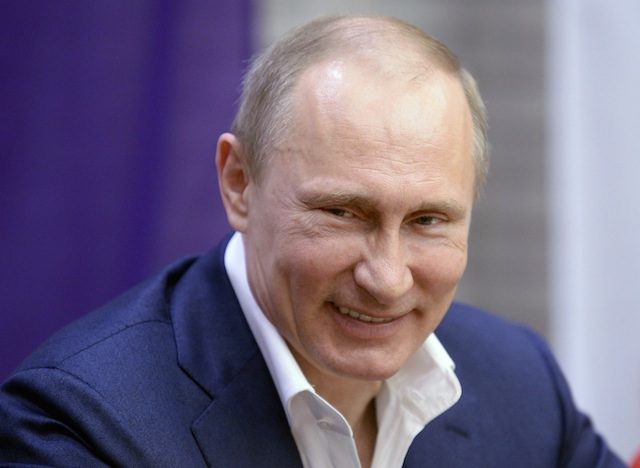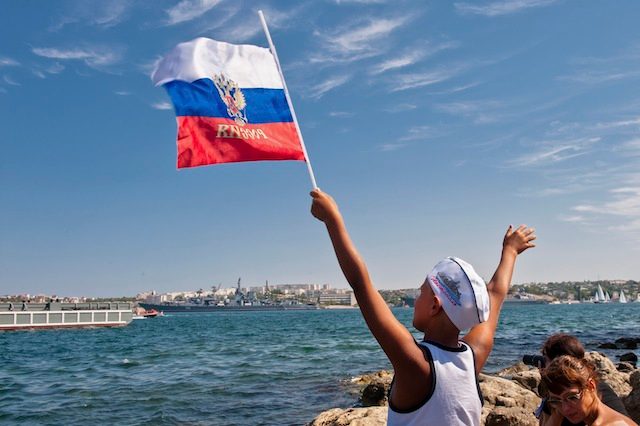SUMMARY
This is AI generated summarization, which may have errors. For context, always refer to the full article.

MOSCOW, Russia – For years he played the part of the frosty pragmatist, doggedly set on restoring pride and power to a once-great superpower. Then, on February 27, 2014, President Vladimir Putin went rogue.
The decision to send unidentified soldiers into Ukraine’s Crimean peninsula leading to its annexation by Russia was far more than an act of aggression against a recalcitrant neighbor.
It marked a direct assault on the foundations of an international system that has largely held since the end of World War II – reviving the idea of territorial conquest that most had consigned to the historical dustbin.
Putin upended the global rules with considerable chutzpah, sowing just enough uncertainty to keep the world unsure of his intentions or his next move – or whether he had even done anything wrong in the first place.
Like the judo master he is, Putin used the West’s rhetoric of human rights and self-determination against it, deploying a barrage of propaganda first to deny the invasion and then to paint it as a rescue operation to save Crimea from the “fascist junta” that had come to power in Ukraine.
His brazen denials of the facts on the ground caught the world off-guard, but after a decade of controversial interventions in the Middle East it was the West’s objections that sounded hypocritical.
The response at home was overwhelming. Putin’s approval ratings soared to 90% as he oversaw an outpouring of nationalistic pride long buried under the humiliation of the Cold War’s conclusion.
Defeats into victory
With 15 years in power under his belt – 3 terms as president and two as prime minister – the 62-year-old has seen world leaders come and go, including 3 US presidents and as many French and British leaders.
The controversies have piled up – the vicious war against Islamic separatists in Chechnya launched weeks after taking power in 1999; the war with Georgia in 2008; the suffocation of independent media, and the steady marginalization of any political opposition.
2014 could have been a terrible year for Putin.
The pro-European protests in Ukraine threatened to tear yet another ex-Soviet republic from Russia’s orbit.
The bargain he had struck with voters at home – a weakening of political freedoms in exchange for economic stability – was rattled by collapsing prices for oil, on which Russia so heavily relies.
But instead he turned the looming defeats into a series of propaganda victories.
While the West hopes that currency fluctuations and economic sanctions will scare Putin straight, he takes a longer view, analysts claim.
“In 50 or 100 years historians will not be interested in the ruble’s exchange rate,” says Konstantin Kalachev from the Political Experts Group in Moscow.
Like all nationalists, the story Putin tells is one of strength mixed with victimhood: the EU is meddling in Russia’s backyard, NATO is encircling the country, Western decadence is corrupting Russian decency. And he is fighting back.
At times, the rhetoric took on quasi-religious tones. Crimea was so much more than holiday beaches and naval bases, but a “sacred land”, Russia’s “Temple on the Mount”.
“He sees himself as an eternal leader with a mission to save Russia from the West,” says Moscow analyst Maria Lipman.
Many in Europe were shaken, some even labelled him a new Adolf Hitler. Others – particularly those with an anti-American bent – looked on starry-eyed at Putin’s manly refusal to toe the Western liberal line.
Cold War revisited
Putin’s actions in 2014 also proved a boon for nostalgists.
After a quarter-century of messy little emergencies around the globe, the great games and big power rivalries of the Cold War returned.

Spy agencies scrambled to rehabilitate their Russia desks. Fighter pilots buzzed each other over the Baltic.
NATO suddenly recovered from its long identity crisis, leaping up from the autopsy table and dusting off its repertoire of “This will not stand” histrionics.
The question now is how far it can all go.
Already, Putin appears to have reached the high-water mark. The economy could yet implode. The diplomatic isolation – laid bare by the embarrassing cold shoulder he received at the G20 summit in Australia last month from which he scuttled home early – has been greater than he anticipated.
“Putin is a brilliant tactician but he is not a strategist,” says Lipman. For the sake of unconditional control at home and sovereignty abroad, he is willing to sacrifice the economy and Russia’s development.
Whether that gamble will cement his power or lead to his undoing is the million ruble question – or maybe the two million ruble question, given that the currency has lost nearly half its value this year.
After a tumultuous year Putin heads into 2015 with a multitude of challenges, but he still has a few cards left up his sleeve.
The Kremlin remains an indispensable player in nuclear talks with Iran and the civil war in Syria. Putin’s moves to tie up huge energy deals with Turkey, China and India will keep Russia at the heart of global trade.
And he can also count on an unswerving sense of self-belief, says Kalachev.
“He is betting that the nerves of Western leaders are not as strong as his.” – Rappler.com
Add a comment
How does this make you feel?
There are no comments yet. Add your comment to start the conversation.